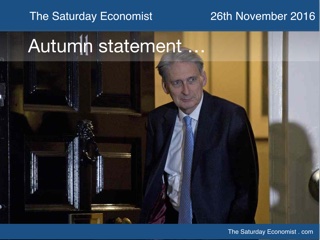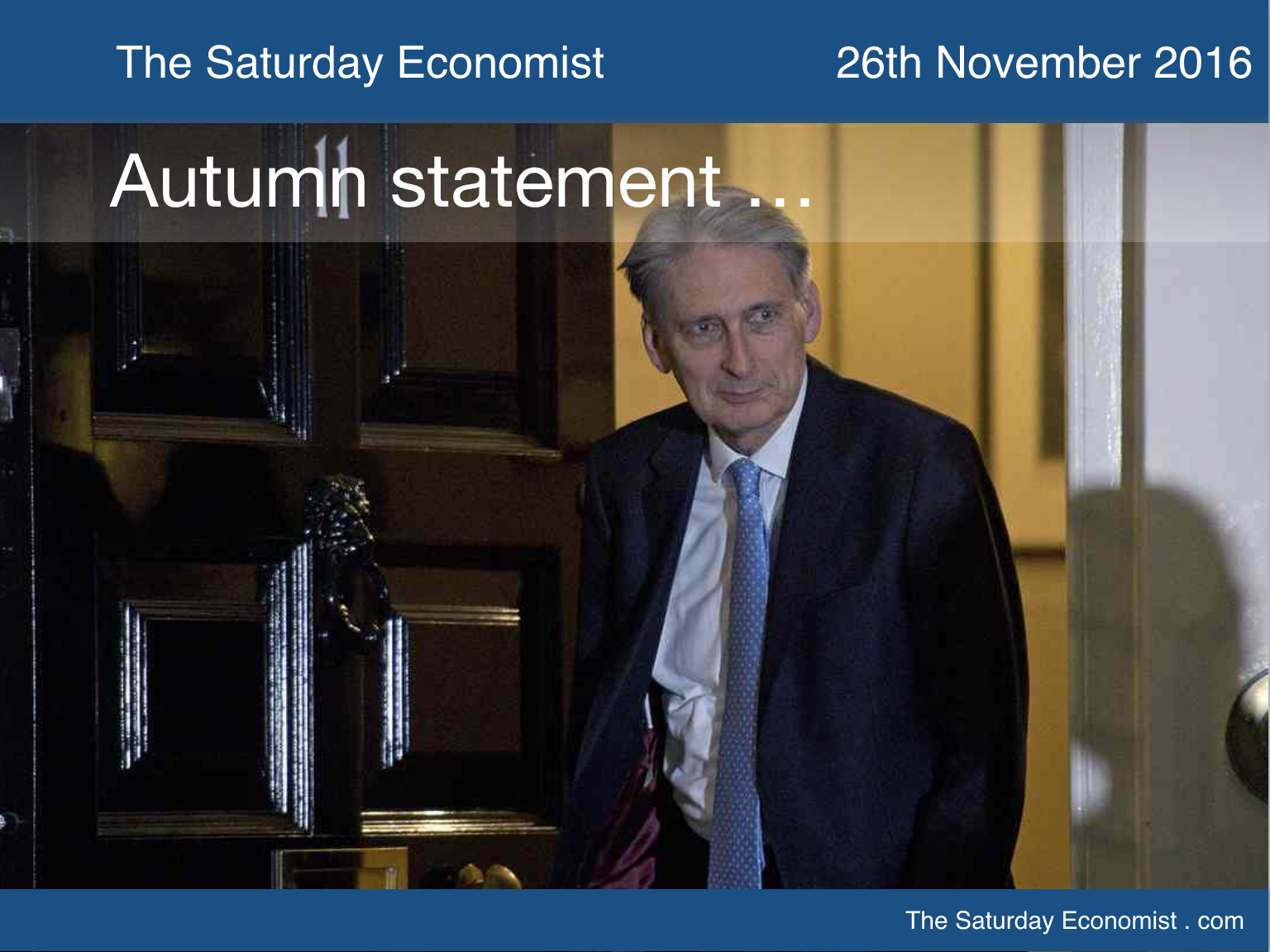 Chancellor of the Exchequer, Phillip Hammond, delivered his first Autumn statement this week. Delivering a country that works for everyone, is a pretty exhausting job. The Prime Minister had wanted to do something for the JAMs, those just about managing. The Chancellor delivered something for the traffic jams, with a significant boost to infrastructure spending. Transport, infrastructure and telecommunications the focus of spending, the Chancellor has charged the newly formed National Productivity Fund with spending £25 billion to improve housing and local infrastructure projects. Almost £5 billion will be devoted to research and development in an attempt to boost productivity. Almost £1 billion will be spent on fibre and 5G connectivity, to develop high speed broadband connectivity across the country. The National Infrastructure Commission will boost spending to just over 1% of GDP. The local growth fund will receive almost £2.0 billion for local transport enhancement. The home builders fund will receive £3 billion. The affordable housing fund will receive £1.4 billion. The housing infrastructure fund will receive £2.3 billion. The Chancellor wants to tackle the longstanding problem of our fastest growing technology firms being snapped up by the "kindness of strangers". An extra £400 million into the Business Bank the solution? Hardly. Ironic in a week, Edinburgh based Skyscanner is snapped up by Chinese travel group Ctrip for £1.4 billion and Stripe's valuation shoots to $9 billion. For the JAM's the Chancellor announced an increase in the living wage, an increase in child care allowance and a commitment to deliver the increase in tax allowances at the lower and higher band. Not much for welfare spending and no changes in business rates, capital allowances and Airport Passenger Duty. Last week we suggested the Chancellor didn't have much to work with in the last Autumn statement. The focus on transport, infrastructure and telecommunications suggests Spreadsheet Phil has a good grasp of the key issues to drive growth in the run up to Brexit. The spending plans will boost growth but won't break the bank as the OBR explained in the latest Economic and Fiscal Update. OBR forecasts ... Robert Chote was in danger of becoming the enemy of the people this week. Or at least the enemy of the Brexit camp. The latest OBR forecasts for the U.K. economy suggested government borrowing was likely to increase by an extra £120 billion over the next five years. Half of the increase could be attributed to the decision to leave the EU, it was explained. Jacob Rees-Moog suggests the forecasts are "too gloomy", Brexit is "terrific" and thanks to Brexit "Happy days are here again" or will be soon, just as soon as we have negotiated the "new deal". The OBR is forecasting growth of 2.1% this year slowing to 1.4% in 2017, rising to 1.7% in 2018 and 2.1% thereafter. The weakness next year a result of a slowdown in household spending and business investment. Government debt is set to rise to over £1.9 trillion over the next few years peaking at 90% of GDP. Should we worry over much about the forecasts? Not really. We expect growth around 2% over the next few years. The service sector will continue to drive growth, consumer spending will continue as earnings rise, business investment in commercial real estate and fixed assets will maintain the momentum from 2016 into next year. GDP Second Estimate Q3 ... The second estimate of GDP growth in the third quarter was released by the ONS this week. Growth in Q3 was confirmed at 2.3%. There were little or no changes to the pattern of output growth. Service sector growth of 3% was driven by a 5% increase in leisure spending and 4% growth in transport and telecommunications. Manufacturing and Construction continue to disappoint. Household spending increased by 2.6%, Investment increased by a modest 1.2%. Government spending was up by less than 1%. Exports appeared to have increased by 4% as import growth remained subdued at just 2.6%. Is this the miracle of depreciation impacting on the economy? Not really. The weakness of domestic demand (up 1.5%) partly to blame for lower imports in the quarter. For the year as a whole the OBR expect growth of 2.1% this year. No reason to expect a significant slow down in 2017 nor 2018 for that matter. The Brexit negotiations will drag on for some years yet. That's assuming Article 50 will be triggered in March next year. So what happened to Markets? Markets, were up - the Dow closed at 19,125 from 18,975. The FTSE closed at 6,840 from 6,775. Sterling was up against the Dollar to $1.245 from $1.234 and up against the Euro to €1.175 from €1.165. The Euro held against the Dollar at 1.059. Oil Price Brent Crude closed at $47.56 from $46.31 The average price in November last year was $44.27. UK Gilts - yields moved down. UK Ten year gilt yields closed at 1.41 from 1.46. US Treasury yields moved to 2.37 from 2.33. Gold closed at $1,245 from $1,296. John That's all for this week ... if you enjoy The Saturday Economist .. JOIN THE SATURDAY ECONOMIST CLUB as an INDIVIDUAL member from just £40 a year. Just click to sign up. Special reports, Survey Results and the Quarterly Economic Outlook are made available to members and sponsors. Don't miss the Business Conference in March next year. The focus on Digital Disruption and the Smart City Challenge! © 2016 John Ashcroft and Company, Economics, Strategy and Social Media, experience worth sharing. ______________________________________________________________________________________________________________ The material is based upon information which we consider to be reliable but we do not represent that it is accurate or complete and it should not be relied upon as such. We accept no liability for errors, or omissions of opinion or fact. In particular, no reliance should be placed on the comments on trends in financial markets. The receipt of this email should not be construed as the giving of advice relating to finance or investment.. ______________________________________________________________________________________________________________ If you do not wish to receive any further Saturday Economist updates, please unsubscribe using the buttons below or drop me an email at [email protected]. If you enjoy the content, why not forward to a friend, the can sign up here ... _______________________________________________________________________________________ For details of our Privacy Policy and our Terms and Conditions check out our main web site. John Ashcroft and Company.com _______________________________________________________________________________________________________________ Copyright © 2016 The Saturday Economist, All rights reserved.
0 Comments
Leave a Reply. |
The Saturday EconomistAuthorJohn Ashcroft publishes the Saturday Economist. Join the mailing list for updates on the UK and World Economy. Archives
July 2024
Categories
All
|
| The Saturday Economist |
The material is based upon information which we consider to be reliable but we do not represent that it is accurate or complete and it should not be relied upon as such. We accept no liability for errors, or omissions of opinion or fact. In particular, no reliance should be placed on the comments on trends in financial markets. The presentation should not be construed as the giving of investment advice.
|
The Saturday Economist, weekly updates on the UK economy.
Sign Up Now! Stay Up To Date! | Privacy Policy | Terms and Conditions | |

 RSS Feed
RSS Feed